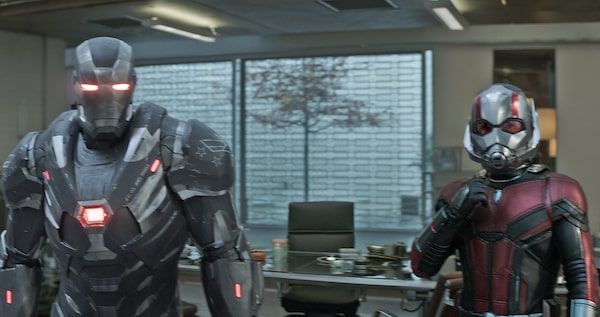
Robert Downey Jr. stars once again as Tony Stark in Avengers: Endgame.Marvel Studios / Disney
- Avengers: Endgame
- Directed by Anthony Russo and Joe Russo
- Written by Christopher Markus and Stephen McFeely
- Starring EVERYBODY
- Classification PG; 181 minutes
Just as in the best of comic books, there is genius, and then there is evil genius. Avengers: Endgame, the 22nd product to roll out from the Marvel Studios factory floor – a staggering achievement in corporate synergy and an everlasting testament to the persuasive power of cash-filled dump trucks over even the most pure of artistic souls – is most certainly the latter. The 181-minute epic is furiously smart and frequently witty. There are instances of indelible delight and glimpses of technical excellence. But the giant cosmic brain powering everything and everyone involved in making Endgame – that would be Walt Disney Pictures – is not using its brilliance for the betterment of art or society. The film is, in a very real way that is wholly absent of irony, as much an evil genius as its own central villain.
Films opening this week: The unstoppable Avengers: Endgame, plus Toronto’s Hot Docs festival begins
Before the accusations of hyperbole and death threats start being tossed around, consider: The big baddie of Endgame, just as in the movie that preceded it, is a towering intergalactic purple warlord named Thanos (again voiced by Josh Brolin) who aims to extinguish half of all living things in order to deliver balance to the universe. Endgame, meanwhile, is a hulking, blood-thirsty beast of its own, created for the sole purpose of dominating the box office and vanquishing every other film in its wake. Thanos is presented as a mad titan, blind to the will of the little guy who wants to fight back. Endgame is just as eager to snap its fingers and make the competition disappear, but there are some crucial differences: It isn’t blind, and there are few left on Earth who will fight back. Endgame knows exactly what it’s doing to the culture. And we all, having followed Marvel’s business strategy this far, will reward it regardless.

Endgame features a few moments of just-this-side-of-genuine emotion, writes Barry Hertz.Marvel Studios / Disney
Why the extreme cynicism? First, the film is simply not good. It is made up of many good parts, tiny moments of just-this-side-of-genuine emotion and the occasional joke that truly lands. Added together, these account for about one-fifth of Endgame’s stupendously unnecessary running time. In recent interviews, screenwriters Christopher Markus and Stephen McFeely have taken pains to stress that the film is “exactly as long as it needs to be.” Any shorter, McFeely told Vulture, “and it would have felt like we weren’t honouring all the threads and franchises that are feeding into this climax.”
Feeding is an unintentionally perfect choice of words. Endgame isn’t a movie in the traditional sense; it is a gaping maw intent on gobbling up the cultural conversation for the explicit purpose of fattening its belly. This crass quarterly-profit hunger isn’t new to Hollywood – the entire studio system is built on such a philosophy – but the sheer scale of it is. Endgame cost hundreds of millions of dollars to make and market, relies on audiences having consumed a decade’s worth of previous cinematic products with a religious fervour and has enlisted every talented performer you can think of (and a few more you haven’t). But if you’re going to go as unprecedentedly big as Endgame, then you best be more hugely and overwhelmingly entertaining than any blockbuster that has come before. You cannot be boring. And Endgame is, in its desperation to conquer, so very boring.
This is the part of the review where I would dive into the plot, but Endgame is not a story so much as it is a series of ostensibly BIG MOMENTS stitched together with sometimes sharp dialogue, sometimes engaging performances, and lots and lots of establishing shots. Disney is fully aware of the narrative landmines they’ve planted here, with critics instructed multiple times by studio reps to avoid revealing almost anything about the movie. The warnings even come with a social-media-friendly hashtag: #DontSpoilTheEndGame.
I’m telling you here and now: Anyone you see using this on Twitter is not to be trusted. Not because Endgame isn’t filled with … well, I suppose you could call them “surprises;” I prefer to call them “ugh, another thing,” as in ugh, another thing that happens just for the sake of things happening. Characters move from one point to another and the film lumbers forward with a stubborn inelegance, compelled only by the pure physics of time itself. Yet none of this criticism matters. By contaminating the idea of merely describing what happens on screen, Disney has shielded itself in a pathetic, albeit maliciously clever, way.
Review: Even by Marvel’s own standards of mediocrity, Avengers: Infinity War fails
To Infinity War and beyond: All 21 Marvel Cinematic Universe movies, ranked
Game of Thrones guide: Catch up on Season 8 episode reviews

The remaining heroes of the Marvel Cinematic Universe are left to take a stand against Thanos in the wake of Infinity War's dramatic climax.Marvel Studios / Disney
And I’ll play along with the studio’s game, because I’ve seen what happens when writers defy corporate orders, and I’m not remotely that brave. So, the bare-bones basics, which I’m only writing about after consulting with the imaginary Disney PR rep who lives in my head: After Thanos wiped out 50 per cent of all life back in Infinity War, it’s up to what’s left of Earth’s mightiest heroes – Captain America (Chris Evans), Iron Man (Robert Downey Jr.), Thor (Chris Hemsworth), and oh God, I’m not going to go through the rest, you already know them all – to take a stand. How they decide to do so is, at least in the film’s middle hour, clever. It is here that co-directors Anthony and Joe Russo are clearly enjoying themselves and letting their imaginations run wild. For a blissful 45 minutes, the movie turns into a reimagining of the entire foundations of the Marvel Cinematic Universe, as if the Russos were allowed to travel back in history and build a franchise that placed a priority on artistic vision, not marketing planks.
Crucially, it is also at this point that Endgame feels, more than any other Marvel movie with the exception of Taika Waititi’s untouchably entertaining Thor: Ragnarok, in tune with the delirious and wackadoo sensibilities of the comic books from which it sprang. Scenes speed along with a zippy momentum, and characters engineered to be staidly predictable are thrown for giant loops. Downey Jr., Evans, Hemsworth and even a small handful of superheroes who aren’t men or talking raccoons (but only a few, and only in moments that are explicitly tokenized in a way that makes Captain Marvel seem enlightened) seem to be truly engaged with the material. It is, basically, damn fun.
But then one [redacted character] does [redacted verb], and then [another redacted character] shows up to [redacted verb], and the entire endeavour loses any sense of emotional stakes or general meaning beyond the deliverance of crass fan service and incomprehensible visuals. (For all the many millions of dollars and presumably billions of man-hours poured into it, Endgame is remarkably ugly to look at.) So even if I could muster the strength to defy studio marching orders on plot details, there is no point. There is little in Endgame that is worth spoiling, given how its core is spoiled rotten to begin with.
Well, okay, here’s one: At the very beginning of the film, and its very end, Thanos (looking even more like a roided-out Shrek than in Infinity War) tells his foes that all their many struggles are for nothing: “I am,” he says, “inevitable.” It is the sort of evil-genius mentality that any right-minded hero cannot help but push back against with all their superstrength. Yet here, again, the film feels more closely aligned to its enemy than its heroes. The success, the pure cultural steamrolling of Avengers: Endgame, is inevitable. But it is a battle worth fighting.
Avengers: Endgame opens April 25.
 Barry Hertz
Barry Hertz